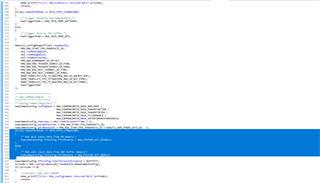Hi Team,
1. For the iwr1443 project in the low-power design scheme of level_sense_demo, the source address of the HWA parameter set of ping and pong is set to gMmwHwaMemBuf[0]. Why are the source addresses of the two not gMmwHwaMemBuf[0] or gMmwHwaMemBuf[1] respectively?
2. Is the DFE output mode in this project Single-chirp mode? If it is this mode, then the completion of the interrupts of ping and pong will trigger the processing of HWA parameter set. Then the source address should correspond to different buffers. Is my speculation correct?
3. When the project is actually debugged, gMmwHwaMemBuf[1](0x52034000) has no data, and the data of gMmwHwaMemBuf[0](0x52030000) is all full. Why is it full here? The project configuration is 2CHIRP, 1frame, 990 samples per CHIRP with 4 bytes per sample.

Kind regards,
Katherine





